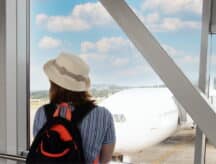Canada’s COVID-19 test requirements on incoming travellers
Canada has required all incoming international travellers over age five to take a COVID-19 test since February 22.
Proof of having a vaccine does not exempt travellers from the test requirement at this time. Generally speaking, travellers need to show a test that has been taken within 72 hours of entry at the border, or their scheduled departure time.
International travellers who have recovered from COVID-19 but continue to test positive may enter Canada, provided they took the COVID-19 test between 14 and 90 days prior to their entry into Canada. This is because those who have recovered from the COVID-19 virus and can test positive for the virus long after they have recovered. At this point, they are no longer infectious, according to the government webpage.
Only some molecular COVID-19 tests are accepted, such as the polymerase chain reaction (PCR) test, and the reverse transcription real time PCR (RT-PCR).
Find out if you’re eligible for Canadian immigration
As part of the original policy, there will be more border officials and Canada’s ports of entry. This is to ensure those arriving understand the new rules.
This pre-arrival COVID-19 test does not replace the quarantine requirement. It is required by law that all travellers coming into Canada must quarantine for 14 days. This means that they must remain indoors and have a plan on how they will get groceries, food and medicine. Those who break quarantine rules may face up to six months in prison or up to CAD $750,000 in fines.
Post-arrival COVID-19 test
International travellers who are driving to Canada are also required to take a COVID-19 test when they arrive in Canada. Land travellers must enter Canada through a port of entry with onsite testing. Currently, there are five ports of entry with onsite testing:
- Douglas, British Columbia,
- Coutts, Alberta;
- Queenston-Lewiston Bridge, Niagra-on-the-Lake, Ontario
- St. Bernard de Lacolle (Highway 15), Quebec
- St. Stephen 3rd Bridge, New Brunswick.
There will be 11 additional land ports who will have onsite testing as of March 4, 2021.
International air travellers must also take a COVID-19 test upon arrival. They must then wait for their results in a government-approved hotel for up to three days. Travellers who get back a negative test will be allowed to go home, but must continue their 14 day quarantine. Travellers who receive a positive test will be relocated to a designated quarantine facility for the remainder of their 14 day isolation period.
Some individuals are exempt from receiving a post-arrival test. This includes people who had a positive COVID-19 test taken between 14 and 90 days before travel. This also includes people who are exempt from quarantine requirements as well as diplomats and diplomatic or consular couriers. Children under five are also exempt.
In total, travellers are generally required to take three COVID-19 tests: one before arriving, one upon arrival, and one towards the end of their quarantine. Information will be provided to travellers when they arrive, on how to get their final COVID-19 test.
Checklist for travellers to Canada
- Travellers must have an approved COVID-19 test. The result can be positive, provided the individual has recovered from COVID-19, and the test was administered 14 to 90 days prior to entry into Canada.
- Travellers must book a room at an approved hotel for their mandatory three-day quarantine. They can do this by calling the designated number.
- Travellers must have a plan for the rest of their 14-day quarantine after leaving the hotel. They are required to know how they will travel to their home or place of quarantine, and how they intend to obtain essential items such as food, groceries or medicine.
- Travellers are also required to install the ArriveCAN mobile application before travelling to Canada. They will be required to provide personal information and flight details on the application. During their quarantine, they will also be required to complete a daily self-assessment on the application.
Find out if you’re eligible for Canadian immigration
© CIC News All Rights Reserved. Visit CanadaVisa.com to discover your Canadian immigration options.
- Do you need Canadian immigration assistance? Contact the Contact Cohen Immigration Law firm by completing our form
- Send us your feedback or your non-legal assistance questions by emailing us at media@canadavisa.com







